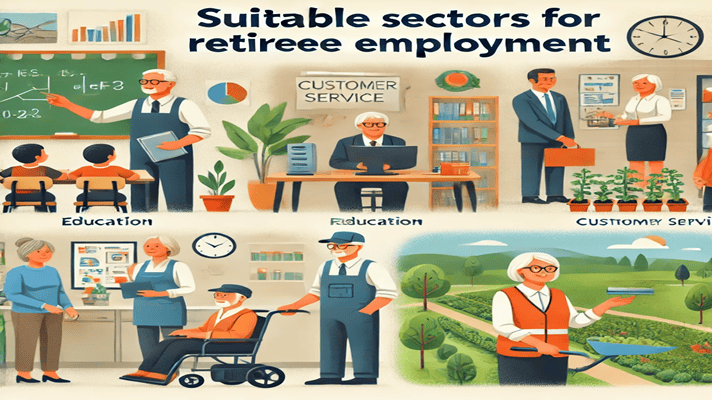Traditional Employment for Retirees: Balancing Work and Leisure

Retirement is changing. It no longer means completely leaving the workforce. In fact, according to the Bureau of Labor Statistics, by 2024 the labor force participation rate for Americans 65 and older will be 21.7%. This trend shows how many retirees are finding fulfillment, socialization and financial benefits in traditional part-time work. Different age groups, particularly older adults, are expected to increase their participation in the labor force, with significant independent work trends among older age groups compared to younger ones. Let’s explore the traditional employment for retirees, the benefits, the sectors and how to find the balance between work and retirement leisure.
Traditional Part-Time Retiree Job Benefits

Working part-time in retirement can have many benefits. For many retired people the extra income provides a nice financial buffer, to stretch retirement savings and live comfortably. A Transamerica Center for Retirement Studies study found 56% of retirees work in retirement for financial reasons. Traditional part-time employment for retirees often includes employee benefits such as health insurance and retirement plans, which are essential for financial and health security. But the employeebenefits go beyond that.
Social and Mental Stimulation
Part-time work can be a great way to stay social. The workplace is often a hub of social activity and a place to make new friends and feel part of a community. This social bit can be especially important for those who might otherwise feel isolated in retirement. Research shows that social engagement in later life is linked to better cognitive function and lower risk of depression.
Plus having a job to go to – even if it’s just a few days a week – can give you a sense of structure and purpose to your days. Many retirees find that having some kind of routine helps them stay mentally sharp and emotionally fulfilled. We hear older people say all the time that their part-time job keeps them “young at heart.”
Continued Learning and Growth
Finally re-entering the workforce can be a great opportunity to learn new skills. Whether it’s mastering a new computer program, learning about a new industry or developing new interpersonal skills the mental stimulation can be very rewarding. This continuous learning not only keeps the mind active but can also boost self esteem and sense of achievement. Nontraditional jobs lacking retirement benefits can affect financial security leading up to early retirement.
Health Benefits
Research has shown that working in retirement can have positive effects on both physical and mental health. A study in the Journal of Occupational Health Psychology found that retirees who worked part-time or temporarily had fewer major illnesses and functioned better day to day than those who fully retired.
Suitable Sectors for Older Workers

When it comes to part time jobs for retirees some sectors are more accommodating and more appealing. Traditional employment opportunities for retirees often fail to provide the same enriching experiences and cultural exposure that nontraditional jobs can offer. While traditional jobs may offer stability, nontraditional jobs, though lacking in retirement and health benefits, provide flexibility and can be more fulfilling. Let’s take a look at some of the most popular:
Retail Jobs
Retail jobs are good for many older people. These jobs are flexible and don’t require heavy lifting. From working in a bookstore to helping in a specialty shop retail jobs can be a pleasant way to be around people and stay active.
Many retirees find their life experience and people skills make them perfect for customer service roles. Whether it’s helping a young couple choose their first set of cookware or another retiree choose the perfect gift for a grandchild these can be fun and rewarding.
Traditional Retail Jobs for Older Workers:
Bookstore associate
Gift shop clerk
Home improvement store specialist
Craft store employee
Clothing store sales associate
Hospitality and Tourism are Classic Jobs for Older Workers
The hospitality and tourism industry has many senior friendly jobs. Hotels, resorts and tourist attractions love the reliability and customer service skills that older workers bring to the table.
Imagine being a tour guide, sharing your knowledge and love of your local area with visitors from around the world. Or a front desk at a hotel where your warmth and life experience can create a warm welcome for guests.
Examples of Hospitality and Tourism Jobs for Retirees:
Museum docent
Hotel concierge
Cruise ship lecturer
National park guide
Wine tasting room host
Administrative and Office Positions
If you’re a retiree who prefers a more traditional employment environment, administrative and office roles can be a good fit. Many companies value the organizational skills and work ethic that retirees bring to these positions.
Part time administrative work might involve data entry, appointment scheduling or managing correspondence. These jobs can be a great way to use your existing skills while learning new ones, if you want to brush up on your computer skills.
Administrative Jobs for Retirees:
Virtual assistant
Medical office receptionist
School administration support
Non-profit organization coordinator
Real estate office manager
Education and Tutoring
Many retirees love to share their knowledge and experience with the younger generation. Education offers many part time work opportunities that can be rewarding and flexible.
Education Jobs for Retirees:
Substitute teacher
Adult education instructor
Online tutor
ESL teacher
After school program coordinator
Healthcare Support Roles
With the increasing demand for healthcare services there are many opportunities for retirees in this area. Many of these roles don’t require extensive medical training but benefit from the life experience and empathy that older workers often have.
Healthcare Support Jobs for Retirees:
Medical receptionist
Patient advocate
Pharmacy assistant
Senior care companion
Medical transportation driver
Work and Retirement Lifestyle
While working in retirement has many benefits, it’s important to get the balance right. After all you’ve earned your retirement and you should enjoy it!
Flexible Retiree Work Options
When looking at part time work look for flexible arrangements that give you control over your schedule. Many retirees find that working 2-3 days a week is the perfect balance, gives you the benefits of work and plenty of time for hobbies, family and relaxation. Gig workers and those in nontraditional work arrangements can find flexible roles that suit their retirement lifestyle, allowing them to maintain financial security without the constraints of traditional 9-5 jobs.
Some companies offer job sharing where two part time employees share the responsibilities of one full time position. This can be a great way to stay connected to the workforce and still have a lot of free time.
Energy and Health
Also be mindful of your energy levels and health considerations. Choose a job that fits your physical abilities and doesn’t leave you feeling drained. Remember the goal is to add to your retirement not exhaust yourself.
Jobs that have a variety of activities throughout the day. For example sitting and standing or customer interaction and quiet independent tasks.
Time for Personal Pursuits
As you get into your part time work routine make sure you schedule time for your personal interests and hobbies. Whether its golfing, gardening or time with the grandkids these are a big part of a happy retirement.
Create a weekly schedule that separates work time from personal time. This will help ensure your job doesn’t intrude on the activities and relationships that make retirement enjoyable.
Tell us
Tell your employer what you need and what your boundaries are. Many companies are willing to work with retirees to create a schedule that suits both. This might mean having certain days off for regular activities or adjusting your hours during certain seasons.
Be clear from the start and you’ll avoid misunderstandings later.
Finding Age-Friendly Employers

When looking for part-time work in retirement, look for employers who value the experience and skills you bring to the table. Here are some ways to find age-friendly employers:
Research Age-Friendly Companies
Look for companies that have been recognized for having a positive attitude towards older workers. AARP puts out lists of the best companies for workers 50+. These companies often have policies and cultures that support older employees, like flexible work arrangements, phased retirement programs and mentorship opportunities. Many older workers, including those with less education, find it challenging to secure traditional employment, so, many retirees will seek age-friendly employers.
Use Senior-Focused Job Resources
Use job boards and resources designed for older job seekers. Websites like RetirementJobs.com, Seniors4Hire.org and AARP’s job board are good places to start. These platforms often have employers who are actively looking to hire retirees and older workers.
Network Within Your Community
Don’t underestimate the power of personal connections. Tell friends, former colleagues, and community members that you’re looking for part-time work. Attend local business events or join professional associations in fields that interest you. Many part-time jobs for retirees are found through word of mouth and personal referrals.
Consider Volunteering as a Foot in the Door
Volunteering is a great way to get your foot in the door with organizations you’re interested in. Many non-profits and community organizations will have experienced volunteers and these roles can sometimes lead to paid work. Even if they don’t, volunteering will help you build new skills and expand your network.
Explore Freelance and Consulting
Your years of experience in a particular field makes you a great candidate for freelance or consulting work. Platforms like Upwork or Freelancer.com can connect you with businesses looking for experienced professionals on a project basis.
Things to Consider When Going Back to Work
Before you get back to work, consider these:
Retirees should consider the availability of retirement plans when choosing part-time work. This is crucial as many seasonal or part-time positions do not offer such benefits, which can impact long-term financial and health security.
Adapting to New Work Environments
Many older workers exhibit similar employment patterns, often transitioning to nontraditional jobs due to the lack of traditional employment options with benefits for retirees. This shift can affect their financial security and retirement prospects.
Social Security Benefits
If you’re getting Social Security, be aware that working might impact your benefits, depending on your age and how much you earn. For 2023, if you’re under full retirement age, you can earn up to $21,240 per year without it affecting your benefits. Check with a financial advisor or the Social Security Administration’s website for current rules.
Healthcare and Insurance
Consider how part-time work will impact your healthcare. Some part-time jobs offer health benefits which could be a nice addition to your retirement package. If you’re on Medicare, make sure you know how your employment will impact your coverage or premiums.
Taxes
Working in retirement will affect your taxes. You might move into a higher tax bracket or a larger portion of your Social Security benefits will be taxable. Talk to a tax professional to understand the implications and plan for it.
Adapting to New Work Environments
Get used to some changes in the workplace. Technology and work practices may have changed since you last worked full-time. See these changes as opportunities to learn and grow. Many libraries and community centers offer free classes to help older people stay current with technology.
Know Your Rights
Get to know the age discrimination laws. The Age Discrimination in Employment Act (ADEA) protects workers 40+ from discrimination in all aspects of employment. While most employers love older workers, it’s good to know your rights and the protections for senior workers.
Technology and the Changing World of Work for Retirees

Technology is changing the world of work and retirees who are tech savvy are reaping the benefits.
Remote Work
Remote work has been a game changer for many retirees. More flexibility and ability to work from anywhere is a big plus for those who want to travel or live in different places in retirement. Research from the National Bureau of Economic Research highlights the positive impact of remote work on the traditional employment patterns of retirees.
Gig Economy and Freelance Platforms
Uber, Lyft, TaskRabbit and Airbnb have created new income streams for retirees. You can work on your own schedule whether it’s driving passengers, doing odd jobs or renting out a spare room. Data from the Health and Retirement Study shows that gig work can significantly impact retirement security by providing additional financial stability.
Online Education and Skill Development
The internet has endless resources to learn new skills or update old ones. Platforms like Coursera, edX and LinkedIn Learning have courses on everything from digital marketing to data analysis so you can stay relevant in the job market.
Success Stories: Retirees Finding Fulfillment in Part-Time Work

Here are a few real-life examples of retirees who have found happiness in their post-retirement careers:
Mary’s Second Act as a Museum Docent
After 35 years as a high school history teacher, Mary found a new calling as a docent at her local history museum. She works two days a week, sharing her knowledge and love of history with visitors of all ages. “It’s the perfect use of my teaching skills and indulgence of my love of history,” Mary says. “And the flexible schedule allows me to spend lots of time with my grandkids.”
Bob’s Second Act as a Consultant
Bob retired from his marketing executive role but found he missed the mental stimulation of his work. He now does part-time consulting for small businesses, helping them develop marketing strategies. “I love being able to share my expertise with young entrepreneurs,” Bob says. “And the project-based nature of consulting means I can take on as much or as little work as I want.”
Linda’s Second Act as a Virtual Assistant
After retiring from her admin job, Linda wasn’t ready to stop working altogether. She now works as a virtual assistant for several small business owners, managing their email, scheduling and basic bookkeeping. “Working from home gives me the flexibility I want in retirement,” Linda says. “And I feel valued for the skills I’ve developed over my career.”
Conclusion
Traditional employment gives retirees the chance to stay busy, socialize and supplement their income. Whether you’re into retail, hospitality, administration, education or other areas, there are many ways to do meaningful part-time work that fits with your retirement lifestyle.
As you look into these options consider your skills, interests and how work will impact your finances and employee benefits. Be open to learning and adapting to change. Remember this is your time to enjoy retirement while still sharing your experience. With the right approach part-time work can add a new dimension to your golden years, not just income but purpose, socialization and personal growth.
Frequently Asked Questions (FAQs)
What are the 2024 Social Security limits?
For 2024, if you’re under full retirement age you can earn up to $22,320 per year without it affecting your benefits. If you reach full retirement age in 2024 the limit is $59,520 for the months before full retirement age. After full retirement age there is no limit.
2. Will part-time work affect my Medicare?
Generally part-time work won’t affect Medicare. However if you’re covered by an employer’s health plan you may be able to delay Medicare Part B enrollment without penalty. Check with your employer’s benefits administrator to find out.
3. Where can I find job search websites for retirees?
Websites for older workers include RetirementJobs.com, Seniors4Hire.org, AARP’s job board and Workforce50.com. These sites often feature employers who value experience.
4. How do I showcase my skills in today’s job market?
On your resume, focus on recent experiences and smart ways to show what you already know. Show how adaptable and techy you are. Consider taking online courses or getting relevant certifications to prove you’re up to speed in your field.
5. What do I need to know about age discrimination?
The Age Discrimination in Employment Act (ADEA) — prohibits age discrimination against people 40 or older workers. If you think age discrimination has happened to you. File a complaint with the U.S. Equal Employment Opportunity Commission (EEOC).
Disclosure: Some of the links in this article may be affiliate links, which can provide compensation to us at no cost to you if you decide to purchase. This site is not intended to provide financial advice. You can read our affiliate disclosure in our privacy policy.
